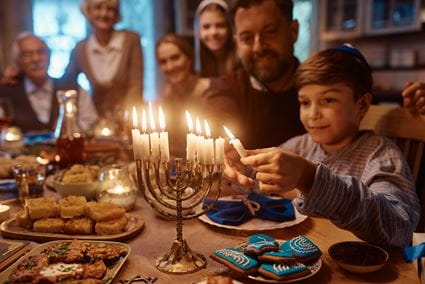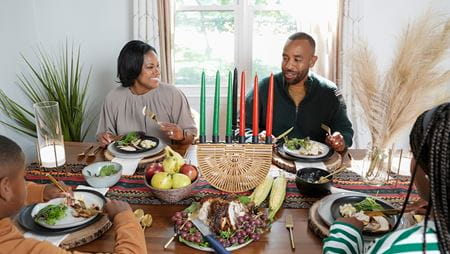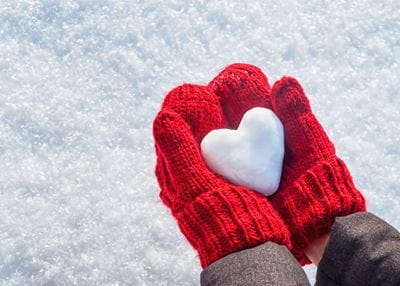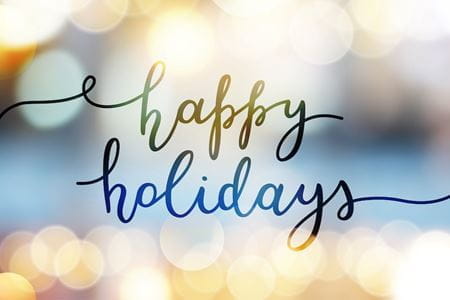BODHI DAY | DECEMBER 8
Bodhi Day, observed annually on December 8, commemorates the enlightenment of Siddhartha Gautama, known as the historical Buddha. This day marks the moment Siddhartha, meditating under a Bodhi tree, realized the root of suffering and the path to liberation, an achievement known as *bodhi* in Sanskrit and Pali.
Traditions and observances vary among Buddhist sects but universally honor the Buddha's attainment of Nirvana and its profound significance for Buddhism. Celebrations may include extended meditation sessions, chanting Buddhist sutras, studying the Dharma, or performing acts of kindness to honor all beings. Some Buddhists gather to enjoy a simple meal of tea and cake paired with meaningful readings.
HANUKKAH | DECEMBER 25 – JANUARY 2
Hanukkah, or Channukah, also known as the Festival of Lights, is a minor holiday celebrated by followers of Judaism. This festival always occurs on the 25th day of Kislev on the Jewish calendar, which this year is December 25-January 2. It commemorates the victory of the Maccabees, a Jewish rebellion against the oppressive Seleucid empire that took place in about 167 BCE.
Triumphantly rededicating an ancient temple recaptured from the Seleucids, the Maccabees found only one bottle of pure olive oil suitable for lighting the candelabrum. But the oil miraculously lasted for eight days, long enough to restore the temple for the worship of God. Today, Jewish people light an eight-branched Chanukah lamp called the menorah, adding one light on each of the eight nights. They eat foods cooked in oil to remember the miracle--not just of oil miraculously burning for eight nights, but the miraculous power given to people dedicated to their beliefs and to justice in the face of overwhelming oppression.
 To show a Jewish patient or family that the hospital is aware of this holiday, health care providers can display electric menorot (plural of menorah) and provide Chanukah food options to patients (if diet permits). A video conference call with family lighting candles or playing dreidel (a special game for the holiday) can help the patient connect and celebrate with family and friends. It is important to note that Hanukkah is considered a minor Jewish holiday. The most important festivals are Rosh Hashanah (the Jewish New Year) and Yom Kippur (the Day of Atonement)—taking place September and October in 2025.
To show a Jewish patient or family that the hospital is aware of this holiday, health care providers can display electric menorot (plural of menorah) and provide Chanukah food options to patients (if diet permits). A video conference call with family lighting candles or playing dreidel (a special game for the holiday) can help the patient connect and celebrate with family and friends. It is important to note that Hanukkah is considered a minor Jewish holiday. The most important festivals are Rosh Hashanah (the Jewish New Year) and Yom Kippur (the Day of Atonement)—taking place September and October in 2025.
PANCHA GANAPATI | DECEMBER 21 - 25
Hindus celebrate Pancha Ganapati to honor Lord Ganesha, the elephant-headed lord of culture and new beginnings. The celebration lasts five days and includes outings, picnics, feasts and the exchange of cards and gifts. Families set up a shrine in the living room. Placed in the center is a large statue or picture of Lord Panchamukha ("five-faced") Ganapati, a form of Ganesha. Celebrants work to mend past mistakes and bring Ganesha’s blessings of joy and harmony into five realms of their life—family, friends, associates, culture and religion.
YULE | DECEMBER 21 – JANUARY 1
Yule is a pagan holiday in honor of the Winter Solstice, which falls on December 21, the shortest day of the year. Yule is a time of giving thanks for the return of light, hope and promise. Some present-day Christmas customs and traditions, including the Yule log, stem from ancient Yule traditions.
 CHRISTMAS | DECEMBER 25
CHRISTMAS | DECEMBER 25
How people choose to celebrate Christmas varies based on religion, faith group affiliation, tradition, culture, experience and practice. For Christians, the significance of the Christmas holiday and Advent season is to celebrate and remember the birth of Jesus Christ.
Advent is the season leading up to Christmas including the four preceding Sundays observed by some, but not all, Christians as a season of prayer and fasting in anticipation of the coming of the Christ Child. Many families light candles on an advent wreath and read scriptures.
A star is placed on top of the Christmas tree to remember the Star of Bethlehem which appears in the nativity story of Jesus’ birth, guiding Wise Men, or Magi, to the newborn king. People exchange gifts in remembrance of the gifts the Magi presented to Jesus, believing that Jesus is the greatest gift of God. Many Christians attend Christmas Eve church services where candles are lit in commemoration of Jesus being the “Light of the World.” The way individuals and families celebrate may be different during the Advent and Christmas season and may include holiday songs, prayers, reading of sacred texts and spending time with family and friends.
KWANZAA | DECEMBER 26 – JANUARY 1
 Kwanzaa is celebrated by many of African descent in America and occurs from December 26 to January 1. In Africa, there are many customs celebrated by ethnic groups, such as celebrating the harvest and giving thanks for good fortune. In America, these basic principles of the harvest celebrations in Africa were adopted to create the observance of Kwanzaa. Although most African Americans do not live in an agricultural setting, Kwanzaa emphasizes the basic principles found in producing the harvest, which include building and maintaining strong and wholesome communities. Kwanzaa is a time to reflect on these basic principles, share and enjoy the fruits of labor, and recommit to the collective achievement of a better life for one’s family, community and people.
Kwanzaa is celebrated by many of African descent in America and occurs from December 26 to January 1. In Africa, there are many customs celebrated by ethnic groups, such as celebrating the harvest and giving thanks for good fortune. In America, these basic principles of the harvest celebrations in Africa were adopted to create the observance of Kwanzaa. Although most African Americans do not live in an agricultural setting, Kwanzaa emphasizes the basic principles found in producing the harvest, which include building and maintaining strong and wholesome communities. Kwanzaa is a time to reflect on these basic principles, share and enjoy the fruits of labor, and recommit to the collective achievement of a better life for one’s family, community and people.
During Kwanzaa, it is customary to greet friends and family with the Swahili phrase, “Habari gani,” meaning, “What is the news?” To respond, answer with the principle of the day. For example, “Umoja” (unity) is the response given on December 26. Fasting, or abstaining from food, is often done during Kwanzaa as a means of cleansing the mind, soul and spirit. There is also a candle lighting ceremony that reinforces the meaning of the seven Kwanzaa principles: Umoja (unity), Kujichagulia (self-determination), Ujima (collective work and responsibility), Ujamaa (cooperative economics), Nia (purpose), Kuumba (creativity) and Imani (faith). These principles are represented by seven candles colored red, green and black.
The evening of December 31 (Day 6) is the Karamu, a joyous celebration with food, drink, dance and music for the collective family and friends. It is a time of rejoicing, reassessment and recommitment. The Zawadi, meaning “precious gift” in Swahili, is a handmade or similarly meaningful gift given to children that may be opened at the Karamu or on the final day of Kwanzaa when Imani is observed.
FEAST OF THE NATIVITY | JANUARY 7
For Orthodox Christians, the Feast of the Nativity, often called Orthodox Christmas, is celebrated on January 7. This date aligns with December 25 on the Julian calendar, which many Orthodox churches continue to follow, differing from the Gregorian calendar used by most western churches.
Preparations for the Feast of the Nativity may include a 40-day period of fasting, emphasizing spiritual reflection and devotion. On the day itself, Orthodox Christians celebrate the birth of Jesus Christ with church services featuring scripture readings, hymns, and prayers. Many traditions also include festive meals shared with loved ones, marking the end of the fast and the joyous arrival of the Nativity.
To support an Orthodox patient or colleague during this season, be mindful of fasting practices and offer opportunities for them to celebrate their faith. Recognizing their observance of the Feast of the Nativity on January 7 reflects respect for their traditions and the diversity of holiday celebrations.
Compassionate Care during the Holidays
 Health care providers can be mindful to offer spiritual and compassionate care to patients of all faiths. It is helpful to be knowledgeable, but important to ask individual patients how they wish to celebrate rather than relying on assumptions. While there are different ways to express values and beliefs, one thing patients have in common in the hospital during the holiday season is that they will not be at home or celebrating in familiar ways.
Health care providers can be mindful to offer spiritual and compassionate care to patients of all faiths. It is helpful to be knowledgeable, but important to ask individual patients how they wish to celebrate rather than relying on assumptions. While there are different ways to express values and beliefs, one thing patients have in common in the hospital during the holiday season is that they will not be at home or celebrating in familiar ways.
It may be helpful to ask patients, “How are you coping during this season?” Hospital chaplains are available and willing to provide support. Providers should check in with their clinical sites to learn more about available compassionate care services.
Notes for faculty regarding learners and trainees observing winter holidays
- Be mindful of winter holidays and days of observance. Reference multicultural and interfaith calendars to ensure that events and critical deadlines do not conflict with holidays.
- If serving food at events, provide dietary accommodations for attendees that are inclusive of diversity dietary restrictions and fasting guidelines.
- Be conscious of the time deadlines are given for assignments and assessments/exams.
- Be mindful that trainees who are fasting may experience fatigue throughout the day.
- Be knowledgeable of where wellness and prayer rooms are in your facility. If your facility does not have an official wellness room or prayer room, identify spaces that can be used in the interim.
